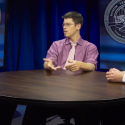Category: Blog
-
18 Theses on the Father and the Son
Last week while I was doing the very important work of riding trains and kayaking in mountain lakes and hiking and playing board games, all my internet theology friends were talking trinitarianism across multiple platforms from various nations. Since I can’t figure out the correct angle at which a latecomer can enter the fast-moving discussion,…
-
John Webster, 1955-2016: “There is Nothing that the Gospel Does Not Explicate”
Some of us will now have to break the habit of calling John Webster the greatest living theologian. In due course we’ll have to find a way to estimate where he ranks, and how well he fits in, among the great list of teachers who have doctored the church. In the front of my copy…
-

Friends with Aristotle and Each Other
Here’s an episode of The Common Room, the periodic vidcast of the Torrey Honors Institute, made possible by OpenBiola. What we try to capture and share in Common Room conversations is a little bit of the ongoing dialogue that makes up the daily life of Torrey. Usually we do that by gathering a few tutors…
-

Doctrine Leaping Out of Its Chains: Review of Young’s “Construing the Cross”
Young, Frances M. Construing the Cross: Type, Sign, Symbol, Word, Action. Eugene, Oregon: Cascade Books, 2015. Frances M. Young’s Construing the Cross is no mere exercise by a young scholar with an idea, research leave and a bibliography. Rather, this is the product of a mature and measured lifetime of study, a small window looking…
-

Love the Perpetrator as the Survivor? Correspondence with a Friend about Loving Your Neighbor as Yourself
A friend and I had a conversation about a situation of systemic and personal abuse she was suffering, which turned into correspondence between us. With permission, I have polished up my exchange with Lori (a pseudonym), as a reflection on what it means for a victim to properly love a perpetrator—a excruciatingly difficult challenge. Lori:…
-
Why Say Dogmatics?
It seems to me that a couple of decades ago, you rarely heard the word “dogmatics” used in polite company. “Systematic Theology” had more or less taken over the usage field. You might hear this sort of statement: “You know my favorite systematic theology? Barth’s Dogmatics is my favorite systematic theology.” But you wouldn’t hear,…
-

Silent No More: CS Lewis’ Cosmological Theory of the Atonement
According to C.S. Lewis’ Ransom Trilogy, our home is “Thulcandra—the silent planet,” for “it alone is outside the heaven, and no message comes from it.” That is to say, no message came from our planet, until Ransom was kidnapped, and brought to Malacandra (or Mars). At a certain point in the story, Ransom learns that Oyarsa,…
-
Biblical Grounding for the Christology of the Councils
I have a brief article in the Criswell Theological Review‘s Fall 2015 theme issue on christology. The article is “Biblical Grounding for the Christology of the Councils,” CTR 13/1 (Fall 2015) 93-104. The main thing I argue in the article is that the most effective way to teach systematic christology is to follow the conceptual structure…
-
Amorites and Exile
This week I got to discuss 1 and 2 Kings with Torrey students. Our sessions were full of surprises (at least for me), and I’m just going to jot down a couple of things I noticed in the course of our conversations. Manasseh was a bad king. After the split into northern and southern kingdoms,…
-
Universal Fatherhood of God: No! and Yes…
There’s a 5-page essay on “The Fatherhood of God” in the 1952 book The Faith: A Symposium of Bible Doctrine. The book, though it never clearly says so, is a collection of essays by Plymouth Brethren writers, and includes among its 25 chapters nice work by F.F. Bruce and W.E. Vine. The essay on the…
-
UnTrinitarian Discouragement (Sibbes)
Richard Sibbes’ (1577–1635) book The Bruised Reed is an extended meditation on discouragement. Sibbes has penetrating insight into how grace and disgrace are always mingled in the life of the Christian. Following his wise counsel can deliver you from unrealistic optimism on the one hand and hopelessness on the other. The “bruised reed” in the…
-

The Hunting Grounds
A recent documentary, The Hunting Ground, explores the tragedy of sexual assault on university and college campuses across the nation. Directed by Oscar-nominated Kirby Dick, maker of The Invisible War, which discusses the epidemic of rape within the military, The Hunting Ground serves as Dick’s startling follow-up into the world of sexual assault. The problem…